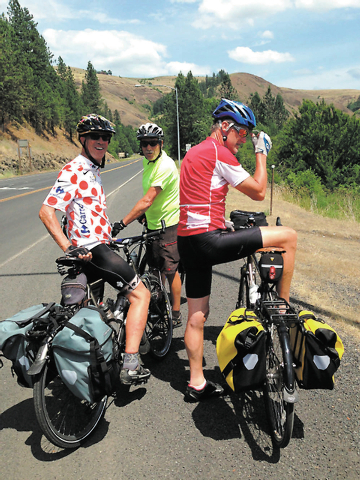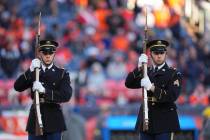Bike ride across America raises money for vets
The early photographs give the impression of serenity — lush summer green along old country roadways and riverbeds, and the sense that the outing is as much an opportunity to clear the head as it is to work the body. Those were the early days of a 4,000-mile bike ride that at times pushed Curt Wildemann’s physical and emotional limits. But he still says it was all well worth it.
The retired 22-year veteran of the Metropolitan Police Department set out on a well-planned summer bike journey from Astoria, Ore., on June 10. Sixty-four days later, he was on the beaches near Yorktown, Va., exhausted but satisfied, knowing his effort helped raise more than $6,200 for the Wounded Warrior Project, which offers programs and services to severely wounded veterans during their time between active duty and transitioning into civilian life.
Early on, Wildemann remembers lots of picture-taking and smiles. But eventually, the long ride started to feel, well, long.
“About two-thirds of the way through, you just want to get it done,” said Wildemann, who had eight other riders with him for much of the trip. Four riders, including him, completed the trip. Others who followed his effort on his website, rideacrossamerica.us, rode along for short stretches.
The trip was about 800 miles farther than another ride Wildemann took, alone, in 2011. The former officer trained for five months for this summer’s effort, which averaged about 65 miles a day of riding. He said the key to training is consistency.
“Some days you may go 10 miles, sometimes a lot more (during training). But you’ve got to be consistent,” he added. “You have to go every day.”
Wildemann took to bicycling for exercise after 40 years of competitive running that included eight marathon finishes — his best time being 2 hours and 34 minutes. He frequently endured 100-mile-a-week training sessions but ultimately he needed a new hip, which ended his running days.
For his Ride Across America effort, Wildemann rode the TransAmerica trail system, which was set up by the Adventure Cycling Association. The course follows back roads across the country, helping to keep riders safe by staying out of heavy-traffic areas.
The final day of the ride, a 38-mile “light” day felt longer than usual, said Wildemann, as traffic and stoplights slowed the pace for him and his team.
“That last day, coming into Virginia Beach, we had been mostly on country roads and didn’t realize what a big city it was,” he said. “There wasn’t any way around having to take the city streets. It was like trying to ride down the Strip. You could smell the ocean and you really wanted to get to it.”
Personal investment
Beyond the physical training, Wildemann made a significant personal investment into the endeavor, spending about $3,000 of his own money to enable the trip. When he first got the idea, about two years ago, he developed his website, advertised for companions in cycling magazines, sent letters seeking sponsors, created posters and worked to find a partner charity.
But many nonprofits treated him with skepticism; they didn’t want to publicize his effort or offer other support. He finally found a partnership with the Wounded Warrior Project.
“When you do something like this, you learn how many charities there really are out there,” he said. “And everybody supports their own causes.”
Having two family members in the armed forces, Wildemann saw the Wounded Warrior Project as a good fit. He was able to educate the public about its efforts through links on his website and give insight into the goals for his trip.
Eventually, sponsors emerged. A bike shop in Oregon gave discounted services. Idaho-based bathtub manufacturer Best Bath Systems donated a support vehicle; several Veterans of Foreign Wars halls chipped in for hotel room stays.
The riders spent all but about five nights under the stars at campsites or public parks. The support vehicle carried camping gear and the riding team, which represented seven different U.S. states and consisted of new acquaintances for Wildemann.
“I’d say that was probably the best part of the trip was meeting all those people,” he said.
One of his fondest memories came in the small town of Pittsburg, Kan., where he and his team were set to camp out for a night in a small park. A local transportation business, Watco Cos., needed the space for its annual picnic, which would accommodate several hundred people that night. The company treated Wildemann’s team to food, entertainment and donations.
Though he crossed the continental divide 13 times and reached elevations topping 11,000 feet, Wildemann said the toughest part of his trip was not in the West’s mountainous regions, but Missouri. During a stretch in a heavy logging area with numerous construction zones, he and his team endured near brushes with large trucks on narrow roadways amid steep hills. The heat and humidity didn’t help, either.
“They (the logging trucks) didn’t like us being there and we knew it,” he said.
Wildemann’s next adventures will likely involve separate bike trips down the East and West Coasts — one extending from the Canadian border to San Diego and another ride that goes from Maine to Key West, south of Florida. He is also considering a ride in England, where a new friend and fellow rider from his Ride Across America trip resides.
All of this comes, of course, after a well-deserved rest.































